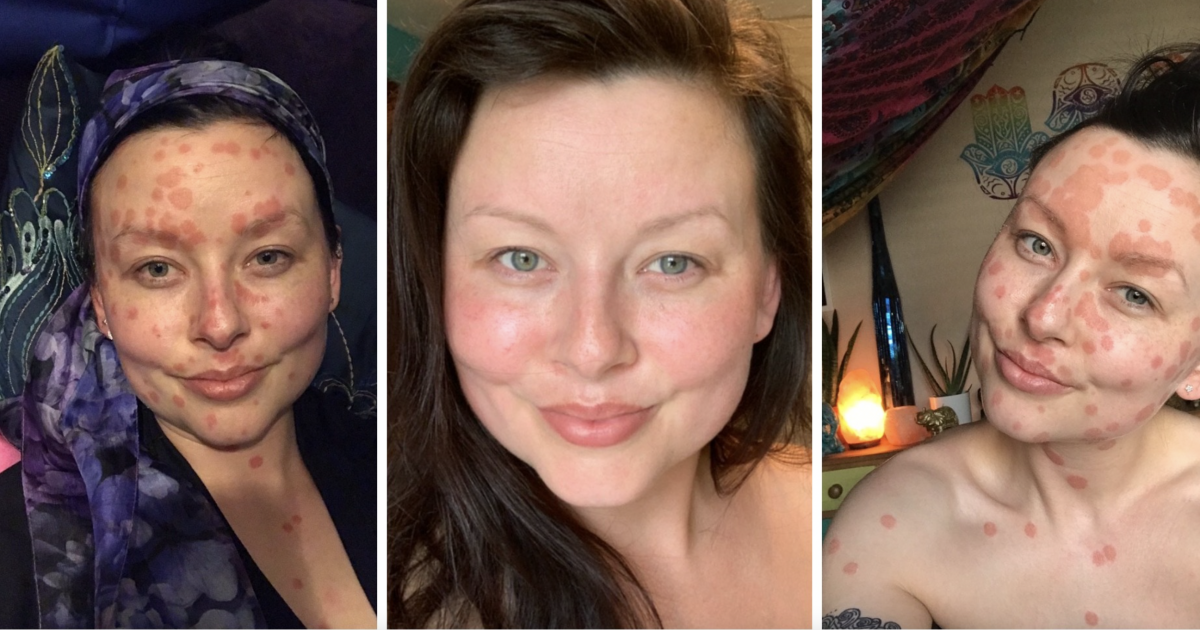Understanding Psoriasis
- Aimee has struggled with psoriasis for quite some time now. But in an effort to help others with the disease, she’s shared her story to promote body positivity amongst other people with psoriasis.
- Psoriasis, in general, is a condition that can cause the development of red, itchy patches on the skin. The condition affects up to 3.2 percent of the U.S. population, according to the American Academy of Dermatology.
- Symptoms associated with psoriasis include red patches of skin covered with silvery scales, small scaling spots, dry, cracked skin that may bleed or itch, itching, burning, or soreness, thickened or ridged nails and swollen or stiff joints. If you ever start to notice red, scaly spots on your body, one of our experts recommends you see a dermatologist right away.
Aimee has had plaque psoriasis, the most common form of psoriasis, since she was around 14 years old. But when she was 31, tonsillitis triggered her first flare up of guttate psoriasis a form of the disease that typically affects young adults and children and is often caused by a bacterial infection like strep throat.
Read MoreHer guttate psoriasis diagnosis left Aimee feeling “so ugly and so alone.” She didn’t want to see people and even avoided her own reflection. But one day, she decided to make a change.
“I made a brave decision to post a photo of myself on social media,” she wrote. “This was only to explain to my close friends and family what I was going through and to ask them not to ask questions as I was still fragile.
“The response to my photo was completely overwhelming.”
Overnight, Aimee got many new followers and received so much support from total strangers.
“With the support of my friends, family and the amazing community on Instagram, my confidence has slowly come back,” she wrote. “I'm now able to embrace my skin, and I've learned to love myself for the first time.”
She did, unfortunately, receive some negativity from the post (and in-person), but Aimee refuses to let that get her down.
“Luckily the positivity has always outweighed the negativity towards me,” she explained. “I see negative people as bullies who I don't want to waste my time being upset over. They are unimportant to me. In these situations, I just remind myself of what sharing my story on Instagram does for other people who look different.
“I'd much rather be unique and stand out from the crowd than blend in. Being perfectly imperfect is beautiful.”
And as for her advice to others, Aimee’s words are simple: “self-acceptance is the key.”
“If you can learn to love and accept yourself just as you are, then what everyone else thinks becomes so much less important,” she wrote. “You realise the only opinions that matter are those of the people that love you and are kind to you.”
Understanding Psoriasis
Now that we’ve learned about an inspiring story of self-acceptance from a psoriasis warrior, let’s take a step back and understand the condition more fully. Psoriasis, in general, is a condition that affects up to 3.2 percent of the U.S. population, according to the American Academy of Dermatology. It can cause the development of red, itchy patches on the skin. But there are many different types of the disease with plaque psoriasis being the most common.
What Is Psoriasis? Understanding the Different Types and Symptoms of This Rare Skin Condition
"Psoriasis is a chronic, auto-immune skin condition where you have red, scaly patches on the skin," Dr. Saakshi Khattri, a dermatologist/rheumatologist at Mount Sinai Health System, previously told SurvivorNet. "It is a chronic condition, which can ebb and flow. You can have good days and bad days."
People with psoriasis are often asymptomatic, but uncomfortable outbreaks can happen. That being said, psoriasis patches can vary in how they look on the skin. You might have a few spots with scaling similar to dandruff or rashes covering a large portion of your body. The most common places to see psoriasis patches are the lower back, elbows, knees, legs, soles of feet, scalp, face and palms.
"Some patients report itching [or a] burning sensation, but that doesn't tend to be the norm. It certainly can happen," Dr. Khattri explained. "Then if you have psoriasis in the genital area, it can feel uncomfortable just because it's in a very sensitive part of the body. But for the most part, it tends to be asymptomatic."
Symptoms associated with psoriasis include:
- Red patches of skin covered with silvery scales
- Small scaling spots
- Dry, cracked skin that may bleed or itch
- Itching, burning, or soreness
- Thickened or ridged nails
- Swollen or stiff joints
If you ever start to notice red, scaly spots on your body, Dr. Khattri recommends you see a dermatologist right away so you get get a proper diagnosis and the proper care you need.
Psoriasis is a chronic disease that does not have a cure, but there are many different ways to help manage symptoms. Treatment for the disease also varies but the three main categories include topical treatments like ointments or creams you can rub on the skin, phototherapy which uses UVB light to treat the disease and systemic treatments like drugs that target parts of the immune system you can take orally or through an IV.
Learn more about SurvivorNet's rigorous medical review process.


